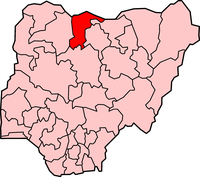Katsina state is found in the NorthWest geopolitical zone of Nigeria. The state’s capital is katsina and other popular towns include Daura, Bindawa, Charanchi and Kankara. Katsina state has a total of 34 local government areas and 3 senatorial zones and the state shares boundaries with Kano, Kaduna and Bauchi. Local governmenty areas in Katsina state include Bakori, Batagarwa, Batsari, Baure, Bindawa, Charanchi, Dan Musa, Dandume, Danja, Daura, Dutsin Ma, Faskari, Funtua, Ingawa, Jibia, Kafur, Kaita, Kankara, Kankia, Katsina, Kurfi, Kusada, Mai Adua, Malumfashi, Mani, Mashi, Matazu, Musawa, Rimi, Sabuwa, Safana, Sandamu, and Zango. There are two Emirates in Katsina state which are the Katsina and the Daura Emirates
The population of the state is estimated at 5,792,579. Islam is the predominant religious persuasion in Katsina with the Sharia law being applied within the state. Teriary institutions in Katsina state include the Federal College of Education katsina, federal University of Agriculture Dutsin-Ma, Katsina state University, Al Qalan University Katsina, Yusufu Bala Usman College of Legal and General Studies Daura, School of Basic and Remedial studies Funtua, and the Isa Kaita College of Education Dutsin Ma.
Popular landmarks in Katsina state include the over 300 years old Gobarau Minaret, the Emir's palace in katsina, Jibia Holiday Resort, National Museum Katsina, Katsina city gate, and the Kusugu well. A number of health facilities are found in Katsina state and these include the General Hospital Katsina, the Federal Medical Center Dandagoro Katsina, Anfani Clinic, Okmos Clinic, Alheri Clinic Kofar Kaura, Dara hospital Katsina, and the General hospital Funtua.
The Governor of Katsina State is Aminu Bello Masari.
Home of Hospitality
Katsina state has a total area of 24,192 km squared and the vegetation falls under the Sudan savannah. The topography features a large expanse of dry, arid land with annual rainfall estimated at 900 mm.
The average temperature of katsina state is 34 degrees centigrade with humidity at 31 percent.
Crop cultivation and Animal rearing are the main source of livelihood in Katsina state. Crops cultivated in Katsina state include groundnuts, rice, millet and brown beans. Trade also flourishes in Katsina state with the state hosting several markets such as the Dandume, Kokami, Mai Adua International, Sheme cattle, Funtua, Malumfashi, and the Magama border markets.
Cattle rearing which is a major economic activity of the Fulani ethnic group is also very popular in Katsina state. A number of minerals are deposited in Katsina state and these include Kaolin, Marble, Salt, clay, gold, and diamond.
Katsina state was created in 1987 from the old Kaduna state but was founded as early as the 11th century. Islam was introduced to Katsina in the year 1454 with Muhammad Korau as the first Muslim king of Katsina.
Until the end of the 18th century, Katsina was a tributary state of Bornu.Katsina town fell in the year 1806 to the leader of the fulani known as Umaru Dallaji who became the first Emir of Katsina. Past governors/ administrators of Katsina state include
Abdullahi Sarki Mukhtar- 1987-1988
Lawrence Onoja- 1988-1989
John Madaki- 1989-1992
Saidu Barda- 1992-1993
Emmanuel Acholonu- 1993-1996
Samaila Bature Chamah- 1996-1998
Joseph Akaagerger- 1998-1999
Umaru Musa Yar Adua- 1999-2007
Ibrahim Shema- 2007-2015
Aminu Bello Masari - 2015 to date.
4 based on 0 reviews

Find and explore some of the best businesses in Katsina State.
© 2025 Manpower Nigeria. All rights reserved.